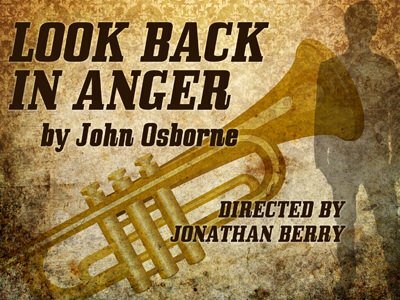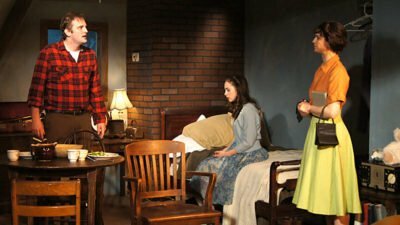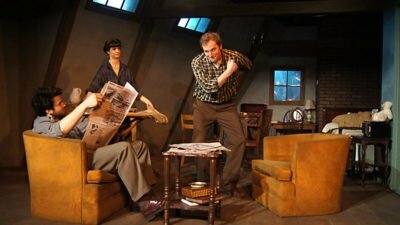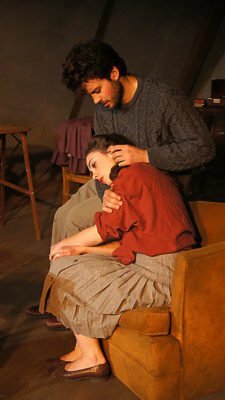Look back in Anger at Redtwist Theatre
Look Back In Anger
By John Osborne
Directed By Jonathan Berry
At Redtwist Theatre, Chicago
“You’re hurt because everything is changed. Jimmy is hurt because everything is the same. And neither of you can face it. Something’s gone wrong somewhere, hasn’t it?”
-Allison Porter
Relevant Period Drama Addresses the Feelings and Concerns of a Contemporary Audience
In the midst of social and political change surrounding 1955, Jimmy Porter (Joseph Wiens) rants, raves, and degrades those around him to deal with the dissonance he finds in the world. Jimmy must exchange his stubbornness for empathy if he has any hope of repairing his relationships. Director Jonathan Berry takes the angst felt by playwright John Osborne, during 1956 post war England, and makes it feel as if it were written for 2014. Although the play takes place in 1955, its characters and themes are timeless. Disturbingly, yet with heart, Look Back In Anger presents a cautionary tale for the young adults of our generation. Although the cast captivates the audience with a fine balance of anger, sympathy, and poignancy, the performance seemed to favor tone over substance.

Look Back In Anger’s timeless relevancy is enough reason to see this show. The characters and text address a slew of ideas and personality flaws that are rarely discussed. However, just like Jimmy’s orations fall on deaf ears, there’s a risk that the audience will grow just as anxious as Jimmy’s companions. The portrayal of Jimmy requires a hint of endearment so the audience will take notice. If you have a hard time watching unlikeable characters on stage, this show may not be for you. Presenting hard to redeem characters is a difficult task, and director Berry seemed to prefer a superficially terrible man instead of a man who happens to deal with his problems poorly. It’s a valid choice, but the power of this play is in its raw realism. Jimmy’s portrayal lacked a certain depth that would have transcended him from character to human being.

Wiens impressively held his character, but lacked the subtleties the character and text deserved. He gave power to the words, but often disregarded their meaning. Little attention was paid to allowing a moment to play out, instead, letting words spew out with little sub-text. Be that as it may, that is essentially the purpose of his character. Jimmy doesn’t seem to care what others think, everyone must hear his opinions, and if you don’t agree with him, you’re labeled a dunce. Jimmy Porter is an absolutely terrible person and Wiens was extremely successful in embodying that idea, but I found no reason to care for him.

In contrast to Jimmy’s abhorrent behavior, the rest of the cast offers up a breath of fresh air, as well as the crux for the play’s conflicts. Helena Charles (Lucy Carapetyan) exposes Jimmy’s inconsistencies through their love affair. Cliff Lewis (Japhet Balaban) is generally dismissive toward Jimmy, shows compassion for Allison, and eventually confronts Jimmy head on. Although Balaban’s accent fluctuated at times, his honesty made him a pleasure to watch, giving the audience someone to root for. Baize Buzan’s portrayal of Allison is extremely noteworthy. She brings tenderness, deep emotionality, and a wealth of subtle acting, which truly brings the character to life. It’s a performance that is perfectly showcased by the intimate magic of a small storefront theatre.
The Redtwist Theatre space allowed the audience to become guests in the already cramped apartment, beautifully designed by Joe Schermoly. I can’t imagine this play being nearly as effective in a proscenium auditorium. If you’ve ever wanted to see this show, now is the time to do so. To sincerely experience the brutal realism, it needs to be seen in a small theatre. The set design and props did well to bring me into the time and space; however, my suspension of disbelief was broken when electronic cigarettes were used in place of real ones. Since the play falls under the category of realism, anything that would have broken that realism should have been cut. Other breaks in the realism consisted of certain moments played directly to the audience. Normally this would not be an issue, but earlier on the play had already made the choice that it was acceptable for the actors to upstage themselves and each other at times, strongly implying a “fourth wall” that the audience sits behind. In this context, “playing out” would suggest the characters are talking to wall.
With all of the above considered, Jonathan Berry’s production of Look Back In Anger does a wonderful job of expressing the core ideas of Osborne’s script, but misses the depth is deserves. Despite this shortcoming, this production is worth a viewing to experience Osborne’s ideas and continue the discussion.
Recommended
Michael Gerrity
Date Reviewed: May 17, 2014
For more info checkout the Look Back in Anger page at theatreinchicago.com
At Redtwist Theatre, 1044 W. Bryn Mawr, Chicago, IL, call 773-728-7529, www.redtwist.org, tickets $30 – $35, Thursdays thru Saturdays at 7:30 pm, Sundays at 3 pm, running time is 2 hours, 40 minutes with intermission, through June 15, 2014
